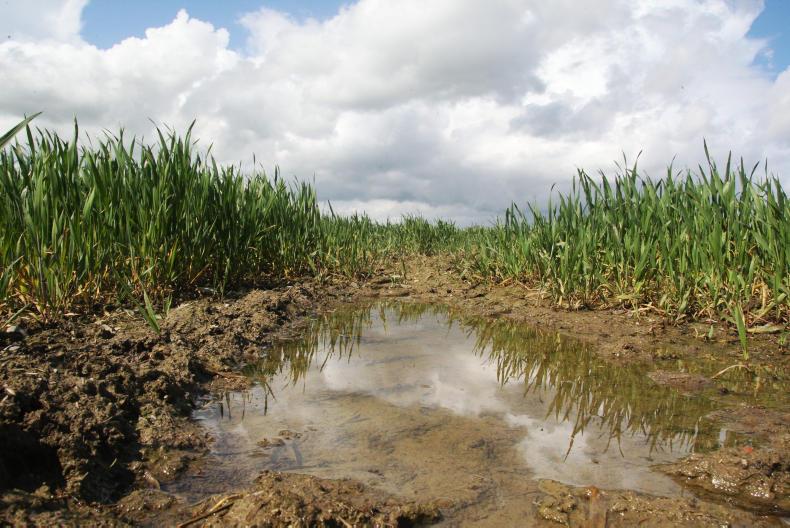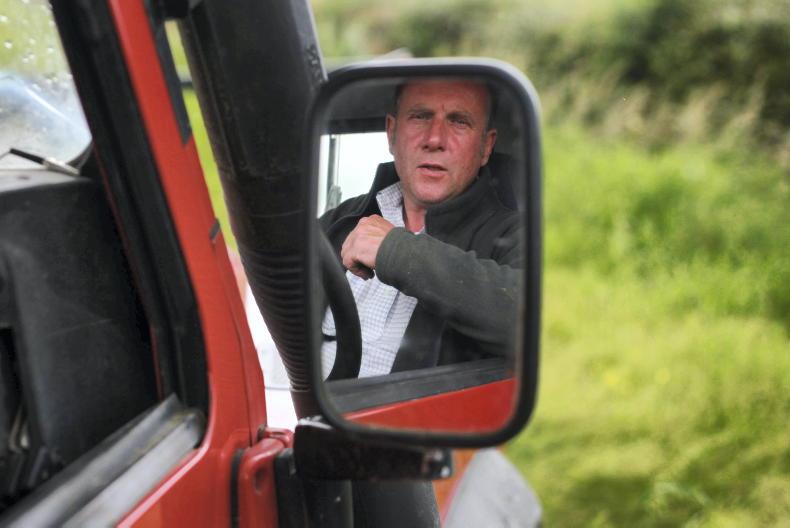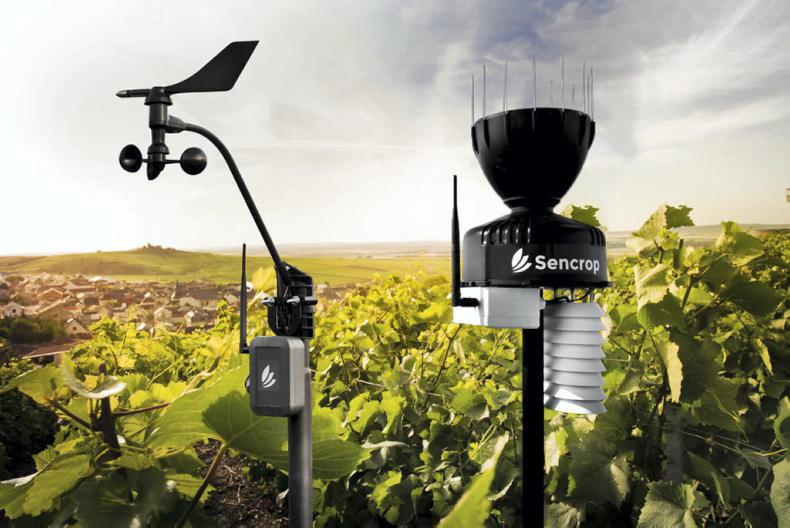With 2019 drawing to a close, it’s safe to say it will be another year remembered for its challenging weather. Earlier this year, we placed 24 Sencrop weather stations on the farms of the 12 farmers taking part in our From the Tramlines series.
The aim was to track the variations in climate and weather conditions throughout the year between each location. In the third-last article of this year’s series, we’ll explore some of the data these stations have collected, with a particular emphasis on rainfall. All 24 stations were fully operational by April 1 and this analysis looked at the weather data from then up until November 18.
Rainfall has been the source of much farmer frustration this year. Despite a dry start to the year, rainfall totals are now up to date and in many cases, are ahead of average for the time of year. Looking to our station data, since April the longest spell with no rainfall lasted just 10 days at the end of June in Swords, Co Dublin. The record for the longest consecutive period of rainfall, i.e. where rain fell at least once a day, is held by our Cork and Kildare stations, which recorded 16 days of rainfall in June and August respectively.
Donegal is shaping up to be the wettest county in the series this year, with 707mm of rain recorded so far. Kilkenny has the lowest rainfall at 553.7mm. August was the wettest month of the year to date, closely followed by September.
Cork saw the highest temperature this year, at 27.5°C on June 27, while Galway saw the lowest so far, -3.7°C on November 18. When looking at the average temperature (day and night) for this period, we see a 1.9° difference between the highest and lowest. These are Wexford, at 12.6°C and Antrim, at 10.7°C. Donegal recorded the highest average humidity throughout the year, at 87.1%.
A backwards spring
The year got off to a somewhat backward start. January and February were unseasonably dry for many and temperatures reached highs of 16°C in places. Winter appeared to arrive as spring was set to begin, with snow and sleet bringing the prospect of any field work to a stop. Our Limerick station recorded the highest rainfall in a 24 hour period, totalling 60.2mm on March 29.
April wasn’t much better, with rainfall for the month averaging 66.2mm across each farm. April also saw the highest wind speed recorded of any station this year, 87km/hr in Limerick with the help of storm Hannah.
May proved to be the driest month of the year so far, with rainfall averaging 29.6mm across each station. Donegal was the exception in this case however, as the station there recorded 67.2mm.
A tricky summer
Most areas saw rainfall in June, but the distribution of this rainfall proved variable. Some areas experienced shorter bursts of heavy downpours, while many others experience prolonged spells and light showers. The wettest day nationwide was recorded on June 6, with a combined rainfall of 228mm between the stations. This equates to an average of 19mm on each station for the day.
Rainfall subsided in July with the notable exception of Antrim, which recorded 92mm for the month. The real challenge arrived in August. This month proved to be the wettest so far, with an average rainfall of 114.6mm across each station. Most areas enjoyed a settled spell at the end of the month, however.
A challenging autumn
September was a month of variation, with some areas experiencing less than half the rainfall of others. All areas enjoyed a fine spell during the National Ploughing Championships, with temperatures as high 22° in places. However, that marked the end of the settled weather. Five stations recorded over 100mm of rainfall for that month.
Wexford saw the highest rainfall in October, at 135mm, while Donegal saw the lowest, at 54mm. All areas saw two to three dry days between October 20-23 and again between October 28 and 30. This may yet prove to be two of the most vital sowing windows this year.
The weather continues to prove a challenge in November, with rainfall averaging 71.5mm across each station for the first 14 days of the month.
Read more
Soil health and your wealth seminar takes place next week
Remainder of potato harvest set to be a struggle
Extreme wet looks like forcing an end to planting
With 2019 drawing to a close, it’s safe to say it will be another year remembered for its challenging weather. Earlier this year, we placed 24 Sencrop weather stations on the farms of the 12 farmers taking part in our From the Tramlines series.
The aim was to track the variations in climate and weather conditions throughout the year between each location. In the third-last article of this year’s series, we’ll explore some of the data these stations have collected, with a particular emphasis on rainfall. All 24 stations were fully operational by April 1 and this analysis looked at the weather data from then up until November 18.
Rainfall has been the source of much farmer frustration this year. Despite a dry start to the year, rainfall totals are now up to date and in many cases, are ahead of average for the time of year. Looking to our station data, since April the longest spell with no rainfall lasted just 10 days at the end of June in Swords, Co Dublin. The record for the longest consecutive period of rainfall, i.e. where rain fell at least once a day, is held by our Cork and Kildare stations, which recorded 16 days of rainfall in June and August respectively.
Donegal is shaping up to be the wettest county in the series this year, with 707mm of rain recorded so far. Kilkenny has the lowest rainfall at 553.7mm. August was the wettest month of the year to date, closely followed by September.
Cork saw the highest temperature this year, at 27.5°C on June 27, while Galway saw the lowest so far, -3.7°C on November 18. When looking at the average temperature (day and night) for this period, we see a 1.9° difference between the highest and lowest. These are Wexford, at 12.6°C and Antrim, at 10.7°C. Donegal recorded the highest average humidity throughout the year, at 87.1%.
A backwards spring
The year got off to a somewhat backward start. January and February were unseasonably dry for many and temperatures reached highs of 16°C in places. Winter appeared to arrive as spring was set to begin, with snow and sleet bringing the prospect of any field work to a stop. Our Limerick station recorded the highest rainfall in a 24 hour period, totalling 60.2mm on March 29.
April wasn’t much better, with rainfall for the month averaging 66.2mm across each farm. April also saw the highest wind speed recorded of any station this year, 87km/hr in Limerick with the help of storm Hannah.
May proved to be the driest month of the year so far, with rainfall averaging 29.6mm across each station. Donegal was the exception in this case however, as the station there recorded 67.2mm.
A tricky summer
Most areas saw rainfall in June, but the distribution of this rainfall proved variable. Some areas experienced shorter bursts of heavy downpours, while many others experience prolonged spells and light showers. The wettest day nationwide was recorded on June 6, with a combined rainfall of 228mm between the stations. This equates to an average of 19mm on each station for the day.
Rainfall subsided in July with the notable exception of Antrim, which recorded 92mm for the month. The real challenge arrived in August. This month proved to be the wettest so far, with an average rainfall of 114.6mm across each station. Most areas enjoyed a settled spell at the end of the month, however.
A challenging autumn
September was a month of variation, with some areas experiencing less than half the rainfall of others. All areas enjoyed a fine spell during the National Ploughing Championships, with temperatures as high 22° in places. However, that marked the end of the settled weather. Five stations recorded over 100mm of rainfall for that month.
Wexford saw the highest rainfall in October, at 135mm, while Donegal saw the lowest, at 54mm. All areas saw two to three dry days between October 20-23 and again between October 28 and 30. This may yet prove to be two of the most vital sowing windows this year.
The weather continues to prove a challenge in November, with rainfall averaging 71.5mm across each station for the first 14 days of the month.
Read more
Soil health and your wealth seminar takes place next week
Remainder of potato harvest set to be a struggle
Extreme wet looks like forcing an end to planting









SHARING OPTIONS